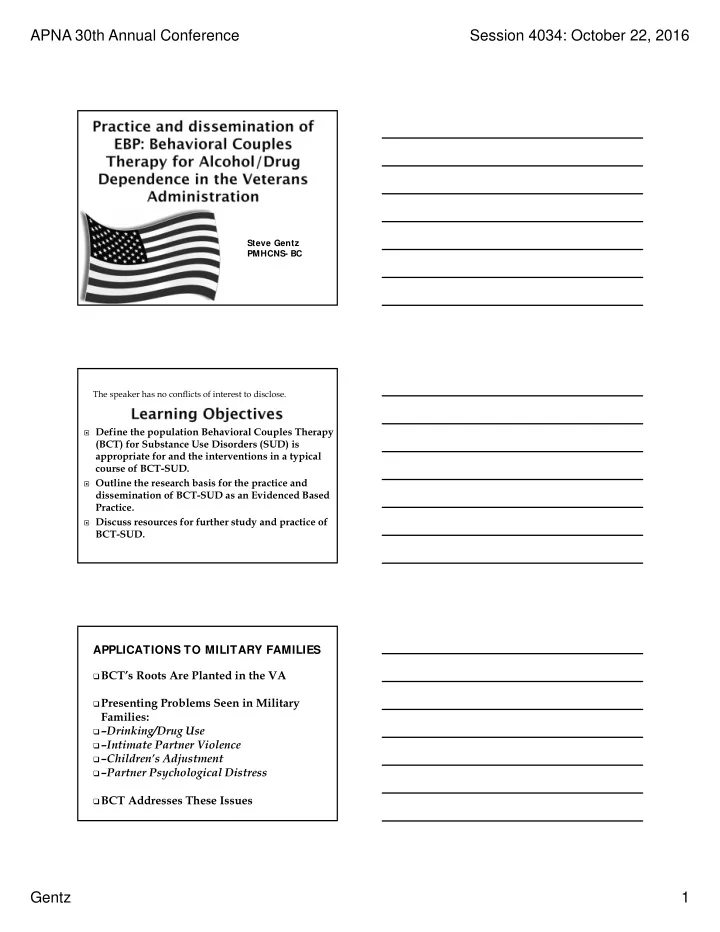

APNA 30th Annual Conference Session 4034: October 22, 2016 Steve Gentz PMHCNS- BC The speaker has no conflicts of interest to disclose. Define the population Behavioral Couples Therapy (BCT) for Substance Use Disorders (SUD) is appropriate for and the interventions in a typical course of BCT-SUD. Outline the research basis for the practice and dissemination of BCT-SUD as an Evidenced Based Practice. Discuss resources for further study and practice of BCT-SUD. APPLICATIONS TO MILITARY FAMILIES BCT’s Roots Are Planted in the VA Presenting Problems Seen in Military Families: – Drinking/Drug Use – Intimate Partner Violence – Children’s Adjustment – Partner Psychological Distress BCT Addresses These Issues Gentz 1
APNA 30th Annual Conference Session 4034: October 22, 2016 Research by O’Farrell Lower Levels of Drinking, Drug Use, and Other Related Behaviors Higher Relationship Satisfaction Lower Levels of Partner/Family Violence Improved Children Adjustment Better Emotional Adjustment for Family Members More abstinence and better relationship adjustment vs. individual treatment (medium effect in meta-analyses – Powers et al 2008; Meis et al 2013) U.S. & U.K. government panels recommend BCT-SUD for use by substance abuse clinicians Despite research support and policy maker’s guidance, BCT- SUD is not well-utilized. Survey of SUD treatment providers found BCT- SUD was one of the least used of the EBPs surveyed (McGovern et al 2004) 2010 national survey of 185 VA outpatient SUD treatment programs found only 6 programs using BCT-SUD (Gifford 2012) Recent reviews say dissemination is highest priority for BCT-SUD research (Meis et al 2013; O’Farrell & Clements 2012) 30%+ of VA SUD pts live with a partner BCT is NOT just for patients with obvious relationship problems All patients with a partner may benefit from BCT support for abstinence VHA Handbook says BCT-SUD an EBP that VA should use for SUD pts Gentz 2
APNA 30th Annual Conference Session 4034: October 22, 2016 Engage both members of the couple Support abstinence with a Recovery Contract (a daily ritual to reward abstinence) and other support for abstinence Improve relationship by increasing positive activities and improving communication Continuing recovery and relapse prevention Denial, Poor Problem Solving, Cognitive Distortions, “checking out” FAMILY SUBSTANCE USE PROBLEMS Nagging, Fighting, “4 O’clock Happy Hour inadvertent Reinforcement of use Communication Positive Skills Training Activities HAPPIER SUBSTANCE RELATIONSHIPS ABUSE RECOVERY Self-Help Recovery Support contract Typical sequence of sessions BAL or urine screen Review of urges/use in past week Review of relationship problems/issues in past week Promises Review of last session, home practice and perform trust discussion in session. New material- instruction, modeling, in- session practice. Assign home practice: Gentz 3
APNA 30th Annual Conference Session 4034: October 22, 2016 Daily Trust Discussion Formula Client Partner “I have been drug and alcohol free for the “Thank you for last 24 hours and plan staying drug and to remain drug and alcohol free for the alcohol free for the last 24 hours. Let next 24 hours. Thank me know how I can you for listening and help during the being supportive of my next 24 hours.” effort to be drug and alcohol free.” Catch Your Partner Doing Something Nice Shared Rewarding Activities Caring Day Assignment Gentz 4
APNA 30th Annual Conference Session 4034: October 22, 2016 Message Message Received Intended MESSAGE Filter Mood- depression Anger Past experiences Stress Listening Skills Expressing Feelings Directly Communication Sessions Plan to talk privately, face-to face, without distractions each giving the other full attention Plan three 10 minute sessions Sit face-to-face Choose a place where you will have privacy and no distractions-TV, cell phones, radio. Start by acknowledging the caring behavior you noticed that day then continue NEUTRAL OR POSITIVE TOPICS Work together taking turns, decide who will be speaker first. Speaker should be brief!! Listener does not respond except to ask related questions. PAY ATTENTION TO BODY LANGUAGE, TONE OF VOICE, AND FILTERS. Negotiating for Requests/Compromise Problem solving skills Conflict, time-out, physical aggression, flooding Gentz 5
APNA 30th Annual Conference Session 4034: October 22, 2016 Timothy O’Farrell , Jeremiah Schumm, Heidi Kar, Maryann Gnys, Shirley Glynn, Keith Klostermann Evidence-Based Psychotherapy Training Program Mental Health Services, U.S. Dept. of Veterans Affairs OVERVIEW: 4 training cohorts enrolled since Sept 2012 92 licensed therapists enrolled in program - mostly social workers and psychologists 74% of therapists completed all program requirements Evaluation of Training Workshop Cohorts 3 & 4 Self-Efficacy Pre/Post Workshop Cohorts 3 & 4 Participant confidence across 3 therapy skill categories: General skills, BCT specific skills, and BCT Crisis Management 5.00 4.93* 4.85* 4.70* 4.50 Degree of Confidence 4.14 3.97 4.00 Pre Survey 3.00 Post Survey 2.00 General Skills BCT Protocol Crisis Mgmt Competency Areas Gentz 6
APNA 30th Annual Conference Session 4034: October 22, 2016 N = 40 SUD patients in treatment at VA Completed BCT by therapist in training during consultation phase of training Average 50 years of age & 14 years education Married or cohabiting for 15 years on average SUD Diagnosis - over 80% alcohol, 55% other drugs MH Diagnosis - 53% PTSD, 20% depression or anxiety Gentz 7
APNA 30th Annual Conference Session 4034: October 22, 2016 Couple Satisfaction Index - Patients 60.57 54.54 65 Mean Score 60 55 50 45 p = .056 Baseline End of Treatment Gentz 8
Recommend
More recommend